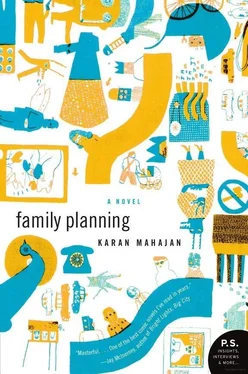But progress had been halted much earlier today. Mr. Ahuja hadn’t woken up.
It was just his luck, thought Arjun, that he couldn’t even go to school. Through no fault of his own he had missed the bus and, by association, Aarti — the only vision that could possibly comfort him, the only pair of eyes that could tell him, in the Morse code of fluttering eyelashes, It’ll be okay. He wanted to see her to be convinced that he wouldn’t be disgusted by the thought of sex for the rest of his life; that Mama and Papa wouldn’t pop up hideously in his mind like a Hallmark Card (paradoxically wholesome) whenever he tried to seduce a woman.
He checked his e-mail. There was no word from her.
So six hours after waking, having played the Metallica album Master of Puppets that Ravi had lent him yesterday — Arjun crept out of the teeming house. He wore his school uniform, took an auto all the way to St. Columba’s and lurked on the other side of the road as the 1:45 P.M. bell went off. Then, whistling, hands in his pockets, Arjun boarded bus #21.
He sat in the back of the bus, in the middle of the wide seat that afforded him a view down the aisle. He watched as a gaggle of seniors from the Convent of Jesus and Mary and St. Columba’s made magnetically for the back — no Aarti. The junior school students all huddled in the front of the bus, shooting sharp glances backward every so often, trying to imagine what it would feel like to sit at the back, far from the driver and the teachers, playing Harry Potter and WWF trump cards with real money or flirting on the footboard, the rumble of traffic only inches from your feet. Arjun ruffled his hair, nervously waved to a boy from his class who said, Oh so you were bunking class all day, good job, yaar . The floor under him suddenly ignited, the engine roaring to life — and it was only then that Aarti climbed aboard, her dark mane of hair flustered around her neck, the satchel slung low on her waist like she could barely carry it. Oh, the sweaty beauty of it all. Arjun clutched his empty bag, now confident that his idea to reserve the seat next to him had paid off. That was the only spot left at the back, and Aarti would have to sit there.
He was wrong.
Aarti swung herself into a seat right at the front, shouldering up against a little boy who barely reached her shoulder. Then she promptly fell asleep.
On the bus, Aarti slept uncontrollably. She slept through everything — the imprecations of the conductor sitting ahead, the sputter of the bus’s exhaust, the unbridled nose blowing of the little boy beside her, even the snap of her head on the axis of its neck as her body succumbed to centrifugality. If only Arjun could hold her head, stroke her hair, be — in other words — a master to her puppet . But the possibility of such manly rescue grew increasingly remote; Arjun’s bus-stop sparkled in the distance, a slab of white-hot pavement. He tensed in his seat, and trapezed his butt over the worn plastic, instinctively readying himself to get off at Khan Market. But then his butt slammed back in place. He couldn’t leave her like this, not after making the arduous journey just to speak to her. And, more importantly, what if no one woke her? What if she slept all the way to the bus depot, and the lecherous bus driver who chewed too much paan roused her, his hand conveniently on her left breast as he said, Hello, baby, you are ishleeping ?
He couldn’t let it happen. The bus trembled to a stop, unloaded its passengers, and then Arjun sighed as his stop was left behind, hopscotching toward the horizon. Arjun moved forward a few seats; a few minutes later, the boy sitting next to Aarti climbed over her cautiously, as if she was a rusty jungle gym, and then he, too, was gone.
Now there was only one problem: Arjun had no idea which stop was Aarti’s. He had never ridden so far in the bus, wasn’t it strange how you could travel in a bus for years and years and only know a small sliver of its route, the origins of your co-passengers a perpetual mystery only seconds away from being unmasked, and yet you did nothing about it — you simply stepped into a cloud of dust at the appointed place at the appointed time and never asked questions. Arjun wished he had asked questions, he wished he didn’t have to use vague parameters like Aarti’s command of English (which was rather good) and the stylishness of her backpack (which was rather big and bulky and ugly, signaling unhealthy ambition) to know when to wake her, and so he was acting purely on intuition when he came up behind her, tapped her on the shoulder with the romantic poise of a judge bringing down the gavel, said “Aarti, your stop is here,” so causing her to startle out of sleep, notice immediately that the bus was stationary and snorting impatiently for her to depart, and bolt right down the stairs with the bag swinging behind her in a neat Olympian arc.
Arjun followed, hands thrust deep in his pockets, the metal boards thudding under his feet.
They faced each other on the dusty bus stop at Nizamuddin. Across from them, a two-storied tomb in the middle of a roundabout. Everything had a heightened vitality. A microcosm for the heat and temper of Delhi. The sky hurtling earthward, steamrolling the soft curve of the Golf Club Flyover in shimmer. The light gentle — not acidic, eye-shutting, traumatizing — a neutral pH of vision, the sun and the clouds deadening each other in pastel shades. Nothing loud. Nothing hurt. Nothing blinked. The sky had suffered a power cut; the branches tangling out from the plant shop behind them were burned wires; the giant tap-head of the blue tomb had been turned off by an arid hand.
He needed to piss badly. Aarti did not know this. Or did she?
Why else was she standing beside him with her head bowed slightly (as if to tame the gloriously upturned nose), arms crossed, sleeves pulled over her hands, the satchel-strap slashing between her breasts so that they bubbled up in her shirt?
Her hand finally windmilled on the axis of her wrist.
He needed to piss very badly.
“This isn’t my bus stop,” she said, smoothing her skirt.
Arjun panicked. “Oh shit! Fucking crap. I’m sorry. No one else got off so I thought—”
Then he ran after the bus.
“Wait!” she shouted behind him, rubbing the craters of sleeplessness under her eyes.
But there was no time to lose. Arjun had rocketed off, his backpack bouncing on the small mound of his butt. As the bus slowed down at the next red light, he leaped over the jamun-wallah on the sidewalk, felt an ice-cream wrapper snag around his foot, and suddenly found himself being jerked into the shell of his backpack with the violent pullback action of a slingshot. It was Aarti. Aarti holding him by his shoulder straps. Gentle, patient Aarti. He could feel her breathing on his shoulder. He wanted to knot the floppy sleeves of her shirt, keep her close like this. She let go of him like a bully who has suddenly seen the face of reason or a schoolteacher.
“Sorry,” she whispered, as he turned to face her, “I didn’t want to make — to make a scene.” This was new to Arjun. To not want to make a scene. To go to such lengths to not make a scene. Unheard of. Undiscovered. Like a cure for cancer or a salve for the Indian cricket team’s bad performance. Like a private piddle that bothered no one.
“I got you into this, I feel bad,” he said, thighs now squeezed together in agony. “I’ll call my car. My driver can drop you.”
“This isn’t your bus stop?” she asked, yawning.
“No,” he said.
“Oh right—” she said, shelving neat strands of hair behind her ears. Her face was beautiful in a way that confounded photographs, a canvas where expressions achieved a profound fixity, a smile or a nervous crimping of the forehead like a thing that could last forever. You could tell she knew this about her face; her hands were always snaky and articulate near her mouth; the arch of her fingers seemed to lead to the prized lips.
Читать дальше












